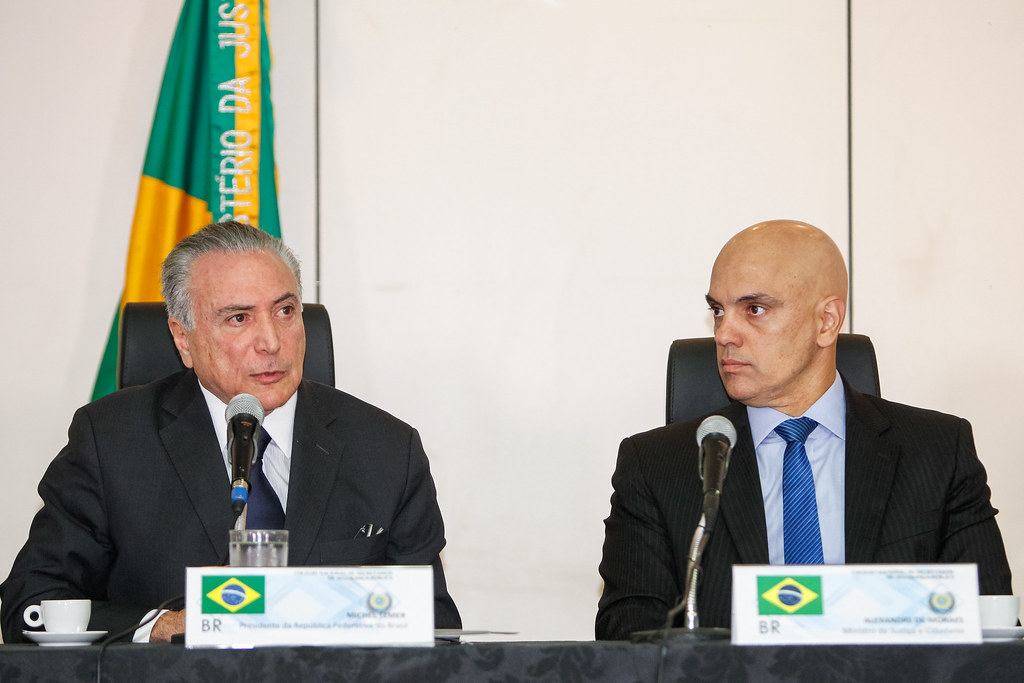President Temer’s nomination of Alexandre Moraes to the Supreme Court of Brazil is proving controversial due to the country’s ongoing corruption scandal.
In Brazil, it is often difficult to separate law from politics. While the country suffers through a severe economic and political crisis, a fight over the country’s judiciary could now be on the horizon. In early January, Supreme Court justice Teori Zavascki died under somewhat mysterious circumstances in a plane crash. Brazil’s President Michel Temer has nominated Justice Minister Alexandre Moraes – a close ally to Temer – as his replacement.
The nomination of political aides is not without precedent in Brazil. Previous presidents Fernando Henrique Cardoso and Luiz Inácio Lula da Silva also appointed confidants to the country’s highest courts. However, nominating Moraes is a controversial move. He is a reviled figure among the Brazilian left, as he rose to prominence as the minister for public safety in São Paulo state, and instructed the police to use heavy force against protesters.
President Temer with Alexandre Moraes.
Contested qualifications
In his earlier career, Moraes briefly held a position as a judge on a lower court, and also worked as an attorney in his own private practice. Moreover, he has published widely. The resume Moraes handed in to officials to back his candidacy is a full 109 pages long, and includes a seemingly endless list of publications.
Yet, doubts have been cast on his qualification for the position. Over the past week, reports have emerged that Moraes appears to have lifted several passages from an unattributed source in a 1997 book on human rights. This is problematic for the 48-year old, as his credibility rests on his reputation as a legal scholar. His books are generally considered reference works in the field of constitutional and human rights law.
However, his standing among the legal community had already been damaged during his brief period as the head of the justice ministry, when a large number of lawyers and law school professors called for his dismissal over his handling of inmate violence in several Brazilian prisons. In January, more than 130 people died in Brazil’s overcrowded prison facilities.
Operation Car Wash
Moraes’ nomination suggests that many in the Temer administration are fearful of what could be uncovered by the ongoing “Operation Car Wash,” an investigation into the corruption scandal involving Brazil’s national oil company Petrobras. A number of administration officials have already been forced to step down after reports linked them to the country’s biggest-ever corruption case. By late February, the Supreme Court is due to begin ruling on the large amounts of evidence gathered during the investigation. Zavascki had been directly tasked with overseeing Operation Car Wash, a responsibility Moraes is set to take over, if approved.
Moraes’ nomination will require ratification by the government-controlled Senate. Hearings have been scheduled for February 22nd. Among the thirteen senators on the Justice and Constitution Committee, which will carry out the confirmation hearings, ten are under investigation as part of Operation Car Wash. Such are the depths of the scandal that Moraes will be asked to help untangle.
Petrobas headquarters (center right) in downtown Rio de Janeiro
A partisan selection
Given President Temer’s low approval numbers, he had been expected to nominate someone considered more politically independent to the eleven-member chamber. With Moraes, Temer went the other way. His appointment dovetails with earlier moves related to the Supreme Court. As interim president, Temer had approved significant wage increases for all government workers, including Supreme Court justices. Many analysts interpreted this as a wink to members of the court that they would be taken care of if they showed leniency towards the governing coalition.
Temer knows that he has virtually no chance to win the presidential elections in 2018. His unpopularity has given him the luxury to push through highly controversial policies such as Brazil’s new austerity law. Backed by a legislative majority and unperturbed by public opinion, the Temer administration is clearly in it for the short haul. They fear what could potentially be uncovered in the Petrobras investigation.
The selection of Alexandre Moraes suggests that Brazil’s governing coalition is bracing for the worst. He will be expected to push back on harsh sentences for his own PSDB party as well as President Temer’s PMDB. There is significant potential for further political unrest if the court decides to place the blame on impeached ex-president Dilma Rousseff’s PT party. Yet, it is unclear whether protesters would be able to muster enough pressure to oust Temer before next year’s election. As so often in Brazil, uncertainty is the safest best.












